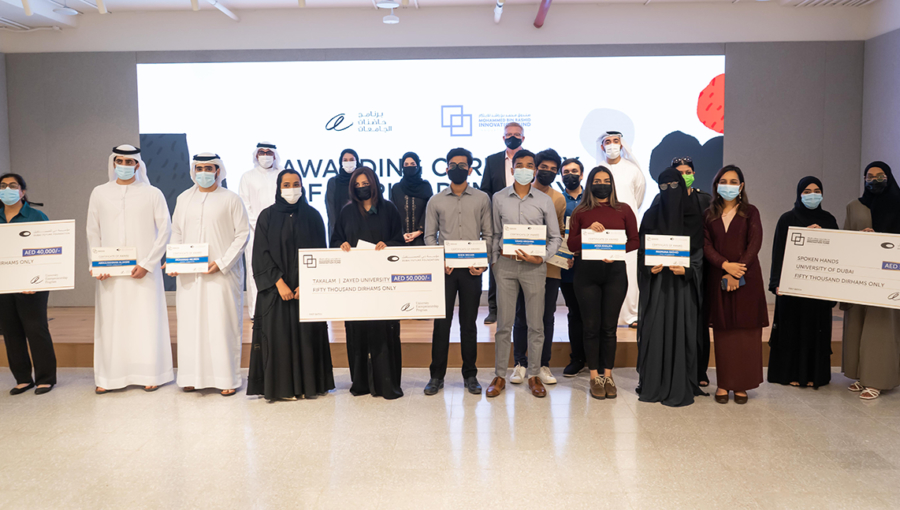- 6 pioneering youth projects successfully advanced to Phase 3
- Incubation phase concludes with a demo day at AREA 2071
- His Excellency Khalfan Juma Belhoul, CEO of Dubai Future Foundation: Today, we witnessed some of the UAE’s talented university students finding the vital support they need from UEP’s stakeholders to translate their ideas into reality
Six pioneering youth projects from four UAE universities have successfully completed Phase 2 and advanced to Phase 3 of the current cycle of the University Entrepreneurship Program (UAE), a Dubai Future Foundation (DFF) initiative. In this phase, they collaborate with Mohammed Bin Rashid Innovation Fund Accelerator to bring their ideas to fruition.
Held in AREA 2071, participants graduating to Phase 3 were selected by a jury that included representatives from Dubai Future Foundation, Mohamed Bin Rashed Innovation Fund, Ministry of Finance, Emirates Development Bank (EDB), and Dubai SME. The projects mark the start of the student journeys in the world of entrepreneurship and innovation through developing solutions that contribute to enhancing various sectors such as power generation, healthcare, and water treatment, among others.
Acadlinks, the project submitted by American University of Dubai students, and Takallam, submitted by students of Zayed University made the cut to advance to the next stage. Also successful in moving to Phase 3 were University of Dubai students with their Spoken Hands and Utilization projects, and Amity University of Dubai students with their Populer and Le Solarium projects.
In the first phase, 12 student teams from six national and international universities participating in the University Entrepreneurship Program (UEP), showcased six innovative projects that leveraged futuristic ideas and advanced technologies.
UEP aims to realize the vision of His Vision Sheikh Mohammed bin Rashid Al Maktoum, Vice President and Prime Minister of the UAE and Ruler of Dubai, in achieving the goals of the sixth article of the Fifty-Year Charter – to transform public and private universities into economic and creative free zones.
Furthermore, the Program drives the implementation of the Dubai Free University Zones Strategy through strengthening collaboration between Dubai government entities, universities, academic institutions and research bodies. These entities come together in developing a curriculum that enables university students to acquire entrepreneurial skills, in line with global best practices to encourage innovation.
The winning teams were selected to join the Mohammed Bin Rashid Fund for Innovation Accelerator, based on a set of criteria that included originality of ideas, their utility, and the ability to apply and develop them into use-case projects. In Addition, the top three winning teams also received financial incentives and cash support.
Welcoming the participants in his keynote, His Excellency Khalfan Juma Belhoul, CEO of Dubai Future Foundation, said: “The University Entrepreneurship Program aims to achieve the vision and direction of Dubai’s leadership to support and empower the youth and university students to become pioneers and employ their creative and technical capabilities in shaping solutions, products and services that can be scaled into practical projects and emerging companies on the ground.”
He added: “These innovative projects represent an impressive start to student journeys in the world of entrepreneurship and provide them with the required support to translate their big ideas into actual projects, courtesy of UEP’s stakeholders. Our partners will continue to provide students with the support they need to develop projects that leverage cutting-edge technology, and to accelerate the application of their pioneering ideas. In doing so, they help the students kick off their contribution to the national economy.”
Fatima Al-Naqabi, the Ministry of Finance representative at MBRIF, stated that the significant interest witnessed among university students keen to participate in UEP confirms the success of the initiative in spreading a culture of innovation and entrepreneurship. Through providing a stimulating and nurturing environment for innovation and entrepreneurship, UEP encourages the adoption of advanced technology in various vital and future-oriented sectors, while preparing youth for the future through building their entrepreneurial capabilities.
Al-Naqabi added that this program and others launched or backed by MBRIF aim to transform public and private universities into economic and creative free zones. In addition, they drive the implementation of the Dubai Free University Zones Strategy through strengthening collaboration and partnership between government entities, universities, academic institutions and research bodies. Such programs enable university students to acquire entrepreneurial skills in line with global best practices to encourage innovation.
UEP has been incorporated into the academic curricula at various universities. While guiding students in enhancing their applied skillsets, the Program builds two-communication with investment entities and business incubators to support student ideas and translate them into viable projects. The innovation-focused curriculum enables university students to understand best practices in entrepreneurship, identify the tools necessary for developing projects and business models, and analyze market needs to determine gaps and build the necessary products and services to plug these gaps. In doing so, it enhances their skills in marketing and commercial development, in addition to equipping them with the practical know how to establish their own company and enter the business ecosystem in the shortest possible time and with minimal costs.
